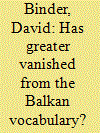| Srl | Item |
| 1 |
ID:
088412


|
|
|
|
|
| Publication |
2008.
|
| Summary/Abstract |
It took twenty-seven years and the ending of the Cold War for former New York Times correspondent David Binder to obtain permission to enter Communist Albania. Once there, in 1990, the author was introduced to both suspicion and traditionally warm hospitality. He found Albania impoverished, as it had been throughout its history, but also rich in talented and thoughtful people. Images of Stalin and of Enver Hoxha, Stalin's Albanian imitator, were still omnipresent. "We are a terrorized people," one student commented. Rebellion was in the air.
|
|
|
|
|
|
|
|
|
|
|
|
|
|
|
|
| 2 |
ID:
097261


|
|
|
|
|
| Publication |
2010.
|
| Summary/Abstract |
Euro-Atlantic" as a political power brand name was employed possibly for the first time in a 1985 speech by Bettino Craxi, then president of the European Council, when he spoke about "Italy's Euro-Atlantic role." Its political usage was codified in the label Euro-Atlantic Partnership Council (EAPC), a group formed in 1997 and which now numbers fifty "partner" governments. EAPC is the successor to the North Atlantic Cooperation Council. (The NACC was created as an adjunct to NATO six years earlier in the first flush of post-Cold War Europe.) Among EAPC partners are not only eleven far-flung (and non-Atlantic-riparian) governments of the former Soviet Union-from Armenia to Uzbekistan-but also the six republics of the former Yugoslavia. Russia itself is listed among the partners, although its leaders remain highly suspicious of the NATO parent.
|
|
|
|
|
|
|
|
|
|
|
|
|
|
|
|
| 3 |
ID:
113296


|
|
|
|
|
| Publication |
2012.
|
| Summary/Abstract |
The North Atlantic Treaty Organization has some strange partners, in terms of history. The oddest couple of all may be Greece and Turkey. The two neighbors fought four wars in the space of a quarter century (1897 to 1922) and are still mutually suspicious. But they have followed parallel courses within the alliance-joining some group actions while remaining aloof to others. Meanwhile, the alliance has over the past two decades changed its posture from defense to offense and from a focus on the European continent to perceived enemies in North Africa, Asia, and the Middle East. Now it is a heavily armed organization in almost desperate search of an antagonist. That is not what Greece or Turkey signed up for when they joined NATO in 1952.
|
|
|
|
|
|
|
|
|
|
|
|
|
|
|
|
| 4 |
ID:
090978


|
|
|
|
|
| Publication |
2009.
|
| Summary/Abstract |
Talk of a "greater" this or that Balkan nation-state has subsided in recent years as the region experienced the creation of ever more minirepublics-a total of eight on the territory of former Yugoslavia. This trend toward fragmentation was initiated by petty nationalists and fostered by the United States and European powers that found it convenient and desirable to dominate and exploit a bunch of fiefdoms. The outside powers reinforced the new system of minirepublics by inviting candidacy in their continental economic organization, the European Union, and their now global security organization, the North Atlantic Treaty Organization. But is "greater" gone forever from the Balkan vocabulary? It might be prudent not to banish the concept. Think of the phrase of the late Willy Brandt spoken in 1989: "Jetzt wächst zusammen was zusammen gehört"-"Now grows together what belongs together." Applied to the Balkans in coming decades the ethnic Albanians now living in at least five Balkan states and the ethnic Serbs living in five states, as well, are developing growing kinship with their fellow nationals beyond the current frontiers and local allegiances that currently separate them.
|
|
|
|
|
|
|
|
|
|
|
|
|
|
|
|
| 5 |
ID:
085314


|
|
|
|
|
| Publication |
2008.
|
| Summary/Abstract |
When and how did the characterization nationalist become an epithet that indicates abuse or contempt? The most obvious advent of the new usage may be found in the journalism and academic writing about the civil wars (1991-95) that doomed the existence of Yugoslavia. Employing nationalist as a negative quantity was made even more explicit by attaching intensifying prefixes such as "ultra" or "extreme." Searches of newspaper and other archives show that nationalist as a denunciatory epithet has continued in the media to the present day, especially as applied to Serbian politicians. It has also begun to infect the discourse among the political parties in Serbia.
|
|
|
|
|
|
|
|
|
|
|
|
|
|
|
|